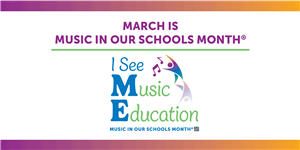-
Music In Our Schools Month

Celebrating Music in Our Schools Month: Why It Matters
March isn't just another month on the calendar; it's a time to celebrate something truly special – Music in Our Schools. Across the nation, communities come together to recognize the importance of music education in shaping the lives of our children. But why does it matter so much? Let's explore the myriad reasons why Music in Our Schools Month is a cause for celebration.
1. Enhancing Academic Performance: Music education has been shown to have a positive impact on academic performance. Research suggests that students who participate in music programs tend to perform better in subjects like math, science, and language arts. Learning to read music notation, for example, can improve mathematical skills, while understanding rhythm can enhance language comprehension.
2. Fostering Creativity and Innovation: Music is a creative art form that encourages students to think outside the box. Through composing, improvising, and performing, students develop their creativity and learn to express themselves in unique ways. These skills are invaluable in today's world, where innovation drives progress in every field.
3. Cultivating Discipline and Perseverance: Learning to play a musical instrument or mastering vocal techniques requires dedication and discipline. Students must practice regularly, set goals, and work towards achieving them. These habits of mind translate beyond the music classroom, instilling traits like perseverance and self-discipline that are essential for success in any endeavor.
4. Building Confidence and Self-Esteem: Music education provides students with opportunities to showcase their talents through performances and recitals. These experiences not only build confidence but also foster a sense of pride and accomplishment. For many students, music becomes a source of self-expression and a channel for boosting self-esteem.
5. Promoting Social and Emotional Learning: Music has the power to evoke emotions and connect people on a deep level. In ensemble settings, students learn to collaborate, communicate, and empathize with one another. They develop important social skills like teamwork, leadership, and active listening, all of which are crucial for building strong relationships and navigating diverse social contexts.
6. Celebrating Cultural Diversity: Music is a universal language that transcends cultural barriers. Through the study of music from different traditions and genres, students gain a deeper appreciation for diversity and cultural heritage. Music education promotes cultural understanding and empathy, fostering a more inclusive and harmonious society.
As we celebrate Music in Our Schools Month, let us recognize the profound impact that music education has on the lives of our students. From academic achievement to social and emotional growth, the benefits of music are undeniable. By supporting music education in our schools, we invest in the future of our children and nurture their potential to become well-rounded individuals who contribute positively to the world around them.
Music In our Schools Month (WCM BAND)
Select a School...
Select a School
- Ignacio Cruz E.C.C.
- School #7 E.C.C.
- Edmund Hmieleski Jr. E.C.C.
- Anthony V. Ceres Elem
- James J. Flynn Elem
- Edward J. Patten Elem
- Dr. Herbert N. Richardson Elem
- Robert N. Wilentz Elem
- Rose M. Lopez Elem
- Dual Language School
- Samuel E. Shull MS
- William C. McGinnis MS
- Perth Amboy High School
- Freshman Academy at PAHS
- Personalized Learning Program at PAHS

